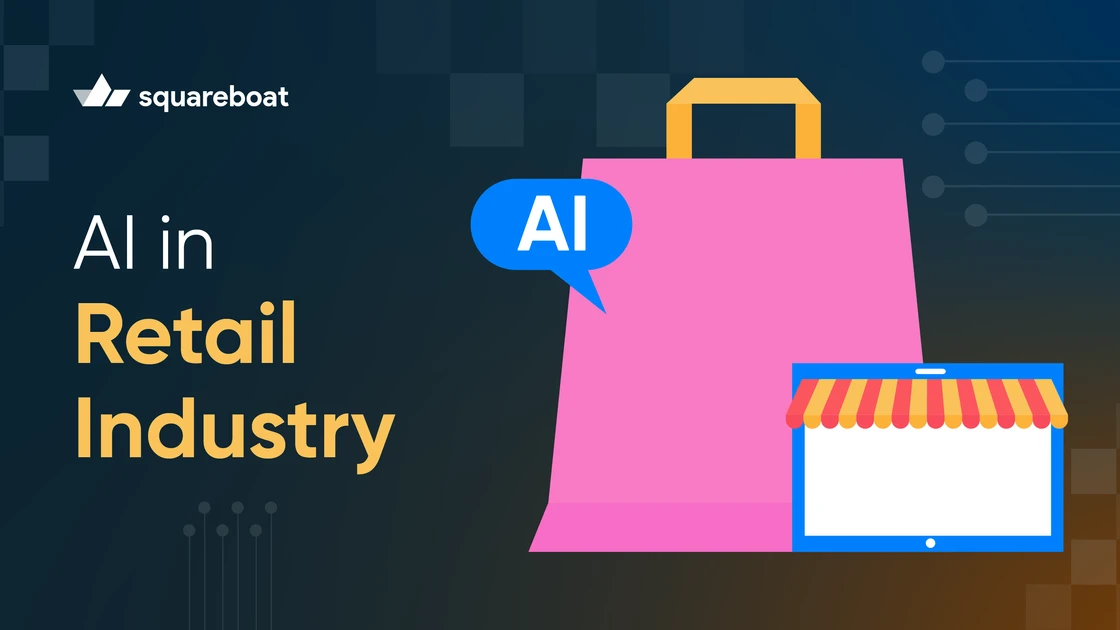Retail used to be all about stocking shelves and hoping customers find what they need. Shoppers had to deal with generic promotions and long waits, while retailers struggled to understand demand and buying patterns. Artificial Intelligence revolutionised this space by bringing predictive analytics, automation, and personalization into everyday retail operations. With AI stepping onto the scene, everything changed in retail by making it smarter and more responsive, driving increased sales and deeper customer loyalty.
What is AI in Retail Industry?
The concept of AI in retail centres on using cutting-edge methods to improve retail operations, such as computer vision, machine learning-based algorithms, and natural language processing. These innovations help streamline retail operations and allow retailers to create highly personalised shopping experiences, improve inventory oversight, and make data-informed decisions in both online and physical stores.
Why is AI Needed in the Retail Industry?
AI is needed in the retail industry because today's consumers expect faster, smarter, and more personalised shopping experiences. AI allows to meet these expectations effortlessly. It brings speed and intelligence to the processes and transforms retail from being product-centric to customer-centric.
AI helps by offering:
Chatbots and virtual assistants for 24/7 customer support
Automated stock replenishment
Smart shelves and virtual try-ons
Personalised product recommendations
Detects fraud and prevents losses
Benefits of Using AI in Retail Industry
AI in retail is transforming the industry by streamlining data processes, strengthening customer relationships, and enhancing operations. As the use of AI in retail grows, this strategic advantage promotes innovation and growth by improving services for both staff and customers.
- Keep inventory in check automatically: Automated inventory management powered by AI reduces human error and speeds up restocking. It predicts demands and provide real time alerts when stock is low or products are moving fatser than expected.
- Make faster and smarter decisions: AI analyses data from sales, customer preferences, and market trends, enabling staff to focus on strategic decisions, improving overall business efficiency.
- Serve customers 24/7: 27/7 AI support increases customer support and loyalty, keeping them satisfied even outside office hours.
- Smarter store operations: Intelligent control of lighting, heating, and cooling systems, automating routine operational tasks using AI, and AI forecasting foot traffic patterns, all of which optimise store operations.
- Linking digital and physical stores: AI integrates data from online and offline sales channels, providing customers with consistent prices and stock information, which reduces human effort and provides real-time data.
- Boosting sales: With the help of AI-driven solutions, retailers can now supercharge their sales and boost conversion rates by customising and streamlining the customer buying experience.
- Improving operational visibility: AI tools that gather and analyze data and offer a more accurate picture of retail operations, improving visibility throughout supply chains, inventory management, and in-store activities.
- Improved delivery speed: AI analyzes real-time traffic patterns, weather conditions, and delivery priorities to plan the most efficient routes for couriers. This dynamic routing reduces delays, saves fuel, and ensures timely arrivals.
- Dynamic pricing: Flash sales and limited-time discounts are automated by AI to attract buyers without compromising margins. This intelligent pricing strategy gives retailers a profitability boost.
Customer satisfaction: AI-powered tools optimise checkout lines, staff availability, and store layouts, enhancing convenience. This leads to customer satisfaction, stronger brand loyalty, and better long-term business success.
AI in Retail Industry: Key Use Cases
The use of AI in retail industry environments is fostering innovation and bolstering operational excellence across a wide range of domains. Below is a thorough summary of the most significant use cases:
Personalised Product Recommendations
One of the most impactful and visible applications of AI in retail is personalised product recommendations. Instead of showing the same product to every customer, AI helps retailers personalise the shopping experience by analysing preferences, past purchases, and even wishlists. Every time a customer purchases something, the AI algorithm learns from that and in the future, the system recommends them items that are most likely to appeal to them.
Therefore, by offering customers exactly what they need, it turns casual browsers into loyal customers, resulting in increased sales for retailers.
Voice Search and Shopping
With AI, customers can shop hands-free, utilising the voice search. With the rise of smart assistants like Amazon Alexa, Google Assistant, and Apple's Siri, shoppers are turning to voice search to shop, compare prices, and get recommendations, all without lifting a finger.
Voice shopping offers speed, ease, accessibility, and personalisation. Now, one can simply go to Google Assistant and say, “Hey Google, add Juice to my cart.". It is this simple now with AI.
Chatbots and Virtual Assistants
Every sector is utilising AI chatbots and virtual assistants to enhance customer support. Same goes at retail, it uses AI chatbots to streamline shopping experience by answering queries, processing returns, and even completing purchase in real time. They are trained understanding natural language enabling human-like conversations. The more they interact with customers, the more trained they will be.
Visual Search
When users can't find what they are looing for, they leave. Visual search solves this, by letting customers snapping the picture of the product and let AI to match the picture with the products in the store's online catalog. AI scans shapes, colors, textures, and patterns to instantly identify and recommend items.
Dynamic Pricing
AI-driven dynamic pricing gives the lead to retailers by automatically adjusting prices based on demands, time of the day, customer behaviours, and competitor pricing. It creates dynamic yet personalised pricing. Retailers can also plan price changes around holidays, flash sales, or major events. Whether it's Black Friday, product relase, some festive sale, or viral product moment, dynamic pricing ensures your prices match the urgency and sentiment of the moment.
Inventory Management and Demand Forecasting
Over-ordering and under-ordering both affects the retailers, AI helps to balance both. By analysing what products are likely to sell and how fast, retailers can eaily manage inventory.Integrating AI across warehouses, stores and ecommerce channels, provides a single view of stock levels. Also, AI enables demand forecasting, prediting when the sales can go up, letting retailers know well before.
Supply Chain Optimisation
It otimises every stage, warehouse picking, delivery routes, and supplier coordinations, so retailers get real-time visibility into their supply-chain, from suppliers to shelves. This keeps supply chain resilient and responsive.
Fraud Detection and Security
AI systems can analyze millions of transactions per second, detecting anomalies human analysis may not catch. Beyond transactions, it also improves identity verification and account security. This helps retailers build strong shopping environements.
AI in Retail Industry: Top Examples
From store shelves to smartphone screens, AI is transforming retail like never before. In this section we'll learn how top international retail brands are applying AI to give smarter and cutomer-centric shopping experiences.
Zara
Since AI has assisted Zara in identifying sales trends and enabling real-time production adjustments, the company has implemented AI to enhance demand forecasting and optimise its supply chain. This gives the company an edge in a dynamic market—reducing overproduction and staying responsive to fast-moving fashion trends.
Walmart
Walmart utilises solutions based on artificial intelligence to enhance customer support and streamline inventory management. AI has greatly assisted the company in optimising stock levels and preventing surplus by tracking inventory and examining purchasing trends. AI-powered in-store robots are also necessary to maintain current inventory data.
Amazon
The most obvious example of Amazon's use of AI is its personalised shopping features, which are driven by intelligent recommendation engines. AI also benefits logistics by automating warehouse operations, optimising delivery routes, and raising overall fulfilment efficiency.
Warby Parker
Warby Parker app uses face mapping-AI and AR for glasses' virtual try on. It analyses the face structure and shows how the fram witll fit and look from different angles. This has significantly increased sales as eliminating the need to visit stores also saving time.
eBay
eBay uses AI-powered visual search, allowing users to either click picture or upload images and find matching or similar products quickly. This helps them discover products even if they don't know the exact name or description.
Key Challenges of AI in Retail
The potential of AI in retail is significant, yet it also brings some challenges that retailers must be ready to tackle.
Ethical AI Use
Every artificial intelligence-driven retail strategy begins with the necessity of ethical AI methods that support openness, responsibility, inclusion, and effective governance. Giving ethical use top priority helps create customer loyalty, employee confidence, and long-term brand integrity.
Customer Sensitivity Thresholds
Retailers must be constantly aware of how consumers perceive digital tracking for operational or marketing purposes in stores. Customer acceptance depends on AI projects complementing public image and brand values.
Data Protection
Every new digital platform, gadget, or collaborator increases complexity and generates more data exposure access points. Choosing vendors or implementing new AI-powered systems requires prioritizing security first.
Enterprise Readiness
It takes a lot of work to adopt new technology, and for best results, close system integration is necessary. Employees need to be ready as well. Working with a tech partner to align infrastructure and business objectives with the right AI tools can facilitate adoption, minimize disruption, and boost return on investment.
Future of AI in Retail
Today’s retailers are tapping into the power of AI in retail industry to connect with customers in more dynamic and personal ways. AI is opening up new possibilities for convenience and interaction by fusing digital and physical touchpoints. Businesses can use the technology to automate repetitive tasks, enhance supply chain operations, and personalise services. Staff members have more time for valuable customer interactions and solving challenging problems thanks to generative AI. Additionally, real-time logistics tracking makes it easier to respond to unanticipated changes. Also, AI in retail is transforming data into action and boosting customer loyalty, so it's more than just a passing trend.
How Squareboat Can Help in Your AI for Retail Journey?
If you're looking to benefit from AI in retail, Squareboat is here to serve you. We offer specialised solutions that use AI chatbots to automate round-the-clock support in addition to improving individualised customer experiences. You can improve your pricing, marketing, and inventory strategies with the aid of our data-driven insights. We lower expenses, increase operational effectiveness, and provide a flawless omnichannel shopping experience by incorporating AI-powered solutions. Additionally, Squareboat uses AI analytics to improve retail security and AI-driven SEO optimisation to increase your online presence. Our experienced in-house developers and full-spectrum support team can make this journey smoother and more impactful.
Conclusion
The influence of AI in retail industry is improving the way businesses operate by increasing productivity, improving client interaction, and developing customised shopping experiences. Retailers can pursue new innovation opportunities and preserve their competitive edge in a shifting market by using quick development of generative AI and analytics. As AI continues to advance, it promises to redefine how we shop, making retail smarter and more convinient for everyone.
Additional Resources


